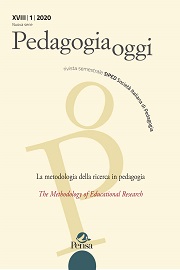The journey as a pedagogical research method
DOI :
https://doi.org/10.7346/PO-012020-05Résumé
During the 20th century, several important educational theorists conducted journeys that
gave them the opportunity to develop particular personal and professional relationships,
and to get to know other educational and pedagogical realities. They could then critically
appraise what they had seen and experienced, deriving significant ideas which would
consolidate, complete, and be integrated with their own pedagogical theories. The journey
as an opportunity for discovery and the acquisition of scientific knowledge, as a
source of innovation, enrichment and professional training, can be seen as a pedagogical
research method that anchors today’s international exchanges (all too often considered a
source of novelty) to their historical roots. By drawing on several examples of scholars
who have a special place in the history of pedagogy – Leonarduzzi, Montessori, Hessen,
Volpicelli, Calò, Maritain and Borghi – and looking at their differences and similarities,
we can identify the fundamental features of this research method, which enables life and
thought to be interwoven into fruitful and original theories.




